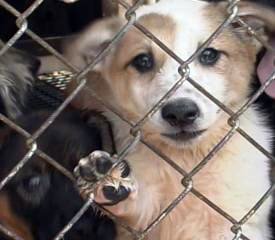 As you peruse the puppy section of your local pet store in the hopes of finding a new member for your household, don’t forget that the lovable animals you are looking at may have had very unpleasant beginnings. Puppy mills aren’t as uncommon as many animal lovers would like to believe. In fact, there’s a good chance that the puppy in the store window came from a commercial operation that prioritizes profit at the expensive of their animals’ health.
As you peruse the puppy section of your local pet store in the hopes of finding a new member for your household, don’t forget that the lovable animals you are looking at may have had very unpleasant beginnings. Puppy mills aren’t as uncommon as many animal lovers would like to believe. In fact, there’s a good chance that the puppy in the store window came from a commercial operation that prioritizes profit at the expensive of their animals’ health.
“Some puppy mill puppies are sold to pet shops—usually through a broker, or middleman—and marketed as young as eight weeks of age,” according to the ASPCA website. “Other puppy mill puppies are sold directly to the public, including over the Internet, through newspaper ads, and at swap meets and flea markets.”
Dangers of Puppy Mills
Squalid living conditions with poor sanitation and poor breeding practices expose “mass-produced” puppies to many health problems. Internal disorders, including heart and kidney disease, are more common in mills. Contagious diseases are also prevalent and can spread between cages in confined areas rapidly. Mange, kennel cough and distemper are just a few of the pathogens often found in mills, according to the ASPCA.
Mill puppies are usually not properly socialized before being advertised or sold to a pet store, so they may be aggressive or fearful around people and other animals. Many are removed from their mother at around six weeks old, which can cripple their ability to socialize in the future.
Quick Tips for Spotting Puppy Mill
You can’t tell much about puppies or their breeder from an advertisement in the newspaper or online, so make sure you learn as much as possible before purchasing a new pet. There are a few “red flags” to look for if you are concerned a breeder is functioning as a puppy mill, according to PAWS.org:
1. The person or group selling the puppy has many other dogs, and types of dogs, for sale.
2. The seller doesn’t allow you to view the area where most of the dogs are kept or that area is concealed from outside view.
3. The seller doesn’t conduct an interview or show interest in who is buying their puppies. Legitimate breeders love each and every one of their puppies, they really do care who takes them home.
4. The breeder has a “no return” policy of any kind on their dogs.
When purchasing a pure-bred dog, always ask to see the pup’s parents. Make sure the mother and father are friendly and in good health before committing.
Consider Adoption
Even if you have your heart set on a particular breed, you should check out a few local animal shelters before purchasing from a store or breeder. Dogs of all shapes and sizes enter animal shelters by the thousands every week. Adopting is less expensive than buying a pet and helps takes the burden off of a network of mostly non-profit organizations that have their hands full dealing with a massive overpopulation of dogs and cats.






Good article, Quentin. We need to get the word out about puppy mills. I’d like to offer a couple of comments on your list of ways to ID a puppy mill:
1. Item #4, the “no return” policy – Many breeders who would absolutely qualify as puppy mill operators do offer a return policy of sorts. I’m always amazed that people don’t read these more carefully. I’ve never seen one that wasn’t lopsided toward the benefit of the breeder. I always recommend that folks take that “guarantee” to their veterinarian to get their opinion on it. Do this BEFORE you pay a dime for the puppy.
2. I’d add this to your list as a red flag…. If the breeder is willing to ship the puppy to you without having ever met you. This indicates that they’re ONLY about the money. It screams “puppy mill”!
To see recent photos of the conditions in some of Iowa’s ~250 mills, visit our website, http://www.iafriends.org. Iowa mills ship approx 100,000 puppies annually to stores all over the country; most to the NY area, Chicago, Florida and California. Please do your homework before buying a puppy!
Comments are closed.